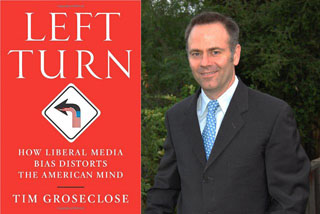Book Report: Left Turn by Tim Groseclose
Posted by Thomas Miller on September 14, 2012 · Leave a Comment

Tim Groseclose is the Marvin Hoffenberg Professor of American Politics at UCLA. The author has made two major claims: 1) The main vehicle of bias in the media is distortion, not lying and 2) the bias is significantly liberal and this bias really matters by what scholars refer to as the “media effect”. Professor Groseclose describes precisely and in great detail the extent to which the “media effect” affects the thoughts and behaviors of people. I will not attempt to cover the extensive research presented (including many mathematics concepts such as the exogenous effect and equations) in this book report. Professor Groseclose and his partner Professor of Public Policy Jeff Milyo from the University of Chicago began work on the media research project in the spring of 2002. The results of their research was published in the Harvard “Quarterly Journal of Economics”, the oldest scholarly economics journal, which, in my view, is all one needs to know about the unquestionable level of scholarship and peer review of the research this book is based upon.
Professor Groseclose admitted that he had formerly been persuaded by the logic that the “media effect” was really not a factor and found it difficult to believe that voters could be systematically fooled into thinking and voting against their natural tastes and values. In other words, the “media effect” could not override rational choice. However, the good professor has changed his view, after all of his and his colleague’s hard work set forth in the book. Distilling their thesis down to its most bare essence to answer the question of “To what degree has the media distorted the political views of the average voter” here’s the formula: 1) The political views of the typical voter are a weighted average of two things; i) his/her natural views (the so-called political quotient he/she would have absent media bias) and (ii) the average slant quotient of the news that he/she receives, the so-called media mu. This weighted average is referred to as the media lambda.
The above may seem confusing without reviewing the mountain of data supporting these conclusions. Trust me that it all makes sense when you read the book. Professor Groseclose’s Epilogue entitled “Small Steps Toward a Better Media”, i.e., a more responsible media, was a real shocker for me. I had always placed many in the media (not all) in the same smelly basket as many politicians, both on the lowest end of professions worthy of scorn and ridicule from the rest of us. However, the good professor after eight solid years studying both concluded the more he came to respect politicians and the less he came to respect journalists! This is no joke. The reason is simple. While politicians, whether we agree with them or not, under our system of government they cannot hide their votes (Art. I, Sec. 5, US Const. – yeas or nays on the floor, no secret ballots, which is routinely used in both chambers). Politicians can attempt to hide from or distort their records or their opponent’s record but the record is available for all to see, even on cable TV – C-SPAN. Speaking of C-SPAN, Martha Radditz of “ABC News”, while appearing on C-SPAN was asked by a viewer who called in about what party she was registered to. She made the standard mainstream media non-reply that she would not disclose (“we don’t talk about those things”) and made the absurd claim that she is just an objective reporter! These left biased media people falsely maintain the charade of objectivity. Ms. Radditz and her ilk, according to the author, are conspiring against the people.
Professor Groseclose has a two part suggestion to begin to reverse the media “Left Turn”. 1) Liberal journalists should actually have conversations with conservatives, much like politicians are forced to do in the halls of Congress and the Capital, even individuals who can’t stand each other. Washington correspondents vote 93-7% for Democrats, according to the research in the book. Therefore, he suggests the best place to start for them would be a trip to King County, TX and Washington County, UT, two Counties that are nearly as conservative in voting as the correspondents are liberal. The correspondents gaining real world perspective could be beneficial to us, the electorate, if they become more balanced in the process. Professor Groseclose calls this suggestion “Mr. Journalist Goes to Washington County” in an obvious salute to the much beloved classic Jimmy Stewart film “Mr. Smith Goes to Washington.”
I highly recommend this work of non-fiction, particularly in this very contentious political season. Happy reading!
